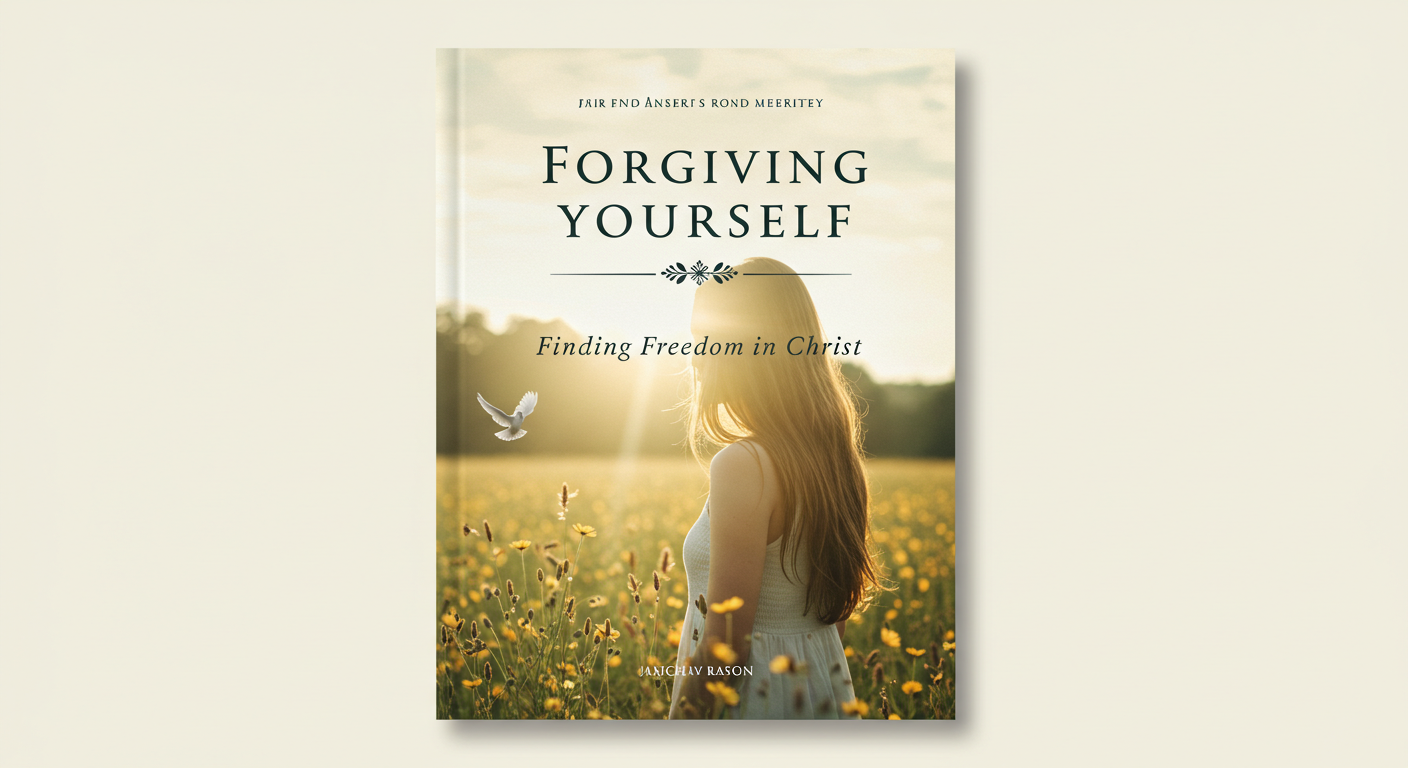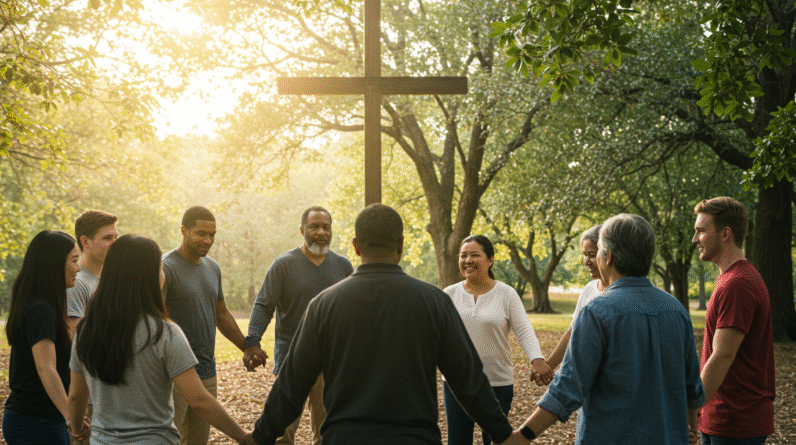The Healing Power Of Forgiveness In The Bible
You carry a lot with you: hurts that never seemed to heal, relationships strained or broken, and a quiet ache that sometimes feels spiritual as much as emotional. The good news is that Scripture gives you a powerful pathway to freedom. When you study forgiveness in the Bible, you find not only moral teaching but a practical, healing dynamic that restores relationships and mends your soul. In this article, you’ll get grounded in what forgiveness means, why it heals, and how to practice it so you actually experience the freedom Jesus offers.
What forgiveness really means
Forgiveness isn’t pretending a wound didn’t happen. It isn’t minimizing your pain or pretending someone’s behavior was okay. Forgiveness in the Bible means you stop demanding payment for a wrong done to you; you release the debt and entrust justice to God. It’s an intentional act of the will that aligns your heart with God’s heart. When you forgive, you choose to let go of the right to retaliate, and you let God be the judge and the healer of your hurt.
Forgiveness is both relational and spiritual healing
When you forgive, healing happens in two directions: relational repair and spiritual restoration. Relationally, forgiveness opens the door to reconciliation, honest conversation, and renewed trust—when both parties are willing. Spiritually, forgiveness frees you from bitterness, anger, and the poison that corrodes your prayer life and your communion with God. That double action is why you’ll see forgiveness in the Bible presented as both a command and a means of healing for the soul.
Why Scripture emphasizes forgiving others
The Bible repeatedly calls you to forgive because God recognizes how toxic unrest and revenge are to individuals and communities. Jesus teaches you to forgive as a reflection of God’s forgiveness toward you. When you forgive, you demonstrate the character of Christ and participate in the gospel. Passages like Matthew 6:14-15 show that your willingness to forgive others affects your own standing before God, because it shapes the posture of your heart toward mercy.
The pattern of grace in Scripture
The Bible sets a pattern: God forgives you much, so you’re called to forgive others. That pattern isn’t merely moralizing; it’s therapeutic. When you remember your forgiven status, you become less likely to harbor grudges and more likely to extend compassion. Verses such as Ephesians 4:31-32 and Colossians 3:13 tie the command to practical transformation—put away bitterness, clothe yourself in compassion, and forgive as the Lord forgave you.
Jesus models forgiveness for you
One of the most powerful scenes in Scripture is Jesus forgiving even as He suffers. On the cross, He prayed, “Father, forgive them, for they do not know what they are doing” (Luke 23:34). That prayer tells you something vital: forgiveness can be an act of love and compassion even when the offender is oblivious to the harm. Jesus shows you that forgiveness is not merely transactional; it’s redemptive. When you emulate that posture, you imitate the heart of God toward sinners—and you open a way for healing that transcends human understanding.
Forgiveness restores relationships — the story of the prodigal son
Luke’s parable of the prodigal son (Luke 15:11-32) is an unforgettable portrait of relational restoration. The father’s extravagant welcome models how God receives repentant people, but it also instructs you on how to forgive family members who wound you. Forgiveness in the Bible frequently looks like a welcome home, an embrace that says, “You are more than your worst choice.” When you extend that welcome, even in small ways, you participate in the healing of a family and the restoration of dignity.
Forgiveness frees you from bitterness — Joseph’s example
Joseph’s life shows you how forgiveness heals personal trauma and restores purpose. Sold into slavery by his brothers, imprisoned, then elevated to power, Joseph finally forgave his siblings and said, “You intended to harm me, but God intended it for good” (Genesis 50:20). That statement doesn’t erase his pain, but it reframes the story under God’s sovereignty. When you embrace that perspective, bitterness loses its grip and you find peace even in circumstances that once felt irredeemable.

Forgiveness and justice — are they at odds?
You may worry that forgiving someone is the same as excusing wrongdoing or denying justice. The Bible draws a distinction: forgiveness in the Bible is a personal release of resentment, not a dismissal of consequences. God remains the ultimate judge, and earthly systems may still require accountability. Romans 12:17-21 (Romans 12:17-21) instructs you not to repay evil with evil, but it also permits leaving room for God’s justice. When you forgive, you don’t prevent consequences; you prevent your heart from being consumed by vengeance.
The cost and freedom of forgiving
Forgiving is costly because it involves surrendering a claim you feel entitled to—whether that’s acknowledgment, apology, or reparation. Yet the freedom you gain outweighs the cost. Psalm 103:12 paints a picture of complete removal: “As far as the east is from the west, so far has he removed our transgressions from us” (Psalm 103:12). When you follow God’s model, you allow Him to remove the burden and heal the wound, even if human reconciliation isn’t possible.
Practical steps to forgive when it feels impossible
Forgiving doesn’t happen by accident; it’s a process. Start by acknowledging the hurt and bringing it to God in prayer. Ask God for the willingness to forgive, and remind yourself of His forgiveness toward you (see 1 John 1:9). Express your feelings honestly—through journaling, counseling, or conversation—then choose to release the debt in your will. If reconciliation is possible and safe, pursue it gently; if not, set healthy boundaries and continue to pray for the offender’s restoration. Those steps embody the practice of forgiveness in the Bible and help move you from bitterness to healing.
A model prayer for forgiveness
You can pray even when words fail you. The Lord’s Prayer instructs you to ask God to forgive you as you forgive others, linking your forgiveness and God’s forgiveness together (Matthew 6:9-13). Use that structure: praise God, confess specific hurts, ask for help to forgive, and commit the situation to God. Prayer rewires your heart because it reorients you toward God’s mercy and away from the poison of resentment. When you pray, you invite the Holy Spirit to do the inner work you can’t achieve on your own.
Forgiveness is not the same as reconciliation
You need to see the difference. Forgiveness is an internal act you control; reconciliation is an external process involving trust rebuilt over time. You can forgive and still decide, for your own safety or health, not to resume close contact. The Bible’s wisdom recognizes both realities. In some cases, reconciliation follows quickly; in others, it never happens. But the act of forgiving protects your heart either way—because forgiveness in the Bible is ultimately about freedom for you more than about guaranteeing another’s change.
When forgiveness is resisted — dealing with ongoing harm
You may be in a situation where the offender continues to hurt you. In those cases, the Bible calls you to protect the vulnerable and hold people accountable. Forgiveness doesn’t mean ignoring abuse or putting yourself back into harm’s way. Hebrews 12:15 warns you to watch for a root of bitterness that can poison many (Hebrews 12:15). That means you can forgive internally while taking steps externally—such as setting boundaries or seeking legal protection—to prevent further harm.
The role of confession and repentance
Biblical forgiveness is closely linked to confession and repentance. When someone admits wrongdoing and seeks reconciliation, Scripture offers pathways for restoration, as seen in James and Paul’s instructions to restore gently those who have fallen (James 5:16; Galatians 6:1). But even when the offender doesn’t repent, you can still release them into God’s hands. The story of Stephen praying for his persecutors as he was dying shows you a radical posture of surrender and trust in God’s justice (Acts 7:60).
Forgiveness and emotional healing
Forgiveness affects your emotions as much as your relationships. Holding onto anger raises cortisol, feeds anxiety, and steals joy. Forgiveness in the Bible is presented as a means of inner healing because it breaks the cycle of rumination and revenge. As you forgive, you often notice a gradual shift: less preoccupation with the offense, fewer nightmares, more restful sleep, and renewed capacity to love and trust. That emotional healing doesn’t always happen overnight, but the biblical pathway leads you toward it.
Community’s role in your healing process
You were never meant to walk the path of forgiveness alone. The church is meant to be a healing community where you receive counsel, accountability, and practical support. Galatians 6:2 tells you to carry each other’s burdens (Galatians 6:2). Sometimes you need a pastor, a counselor, or a trusted friend to speak the truth in love and help you take the next step. By engaging with the community, you allow others to pray with you, hold you accountable, and remind you of God’s promises when bitterness tempts you.
Forgiveness as a spiritual discipline
Like prayer and fasting, forgiveness is a discipline you cultivate. Practicing forgiveness in everyday life trains your heart to reflect Christ. Start with small offenses: the slight at work, the insensitive comment by a friend. Practice releasing those debts quickly and intentionally. Over time, you’ll build a muscle that prepares you to handle deeper wounds. The discipline of forgiveness in the Bible isn’t theoretical; it’s an ongoing choice to put on Christlike attitudes when you’re wounded.
Stories of transformation through forgiveness
You’ll find countless stories in Scripture and Christian history of lives transformed when people chose to forgive. Think of Paul, who went from persecutor to apostle, and of countless modern testimonies where victims of terrible crimes forgave—and found peace. These stories don’t minimize the cost or the time needed for healing, but they demonstrate that forgiveness can lead to freedom, reconciliation, and even unexpected restoration. When you read about these transformations, allow them to give you hope for your own long-term healing.
Forgiveness and spiritual growth
When you forgive, you grow spiritually because forgiveness requires you to depend on God. You cannot manufacture true, lasting forgiveness by sheer willpower alone. You need the Spirit to soften your heart, to give you empathy, and to remind you of your own need for grace. Passages like Colossians 3:13 encourage you to bear with one another and forgive as the Lord forgave you—an invitation to deeper Christlikeness.
Daily practices to cultivate forgiveness
Create simple habits that keep forgiveness active in your life. Begin each day in prayer, asking God to help you notice opportunities to forgive. Keep a gratitude list to reduce resentment. When old hurts resurface, journal about them and take them to God. Seek counseling if wounds are deep. These daily practices help you live out forgiveness in tangible ways and make the healing process visible in your life. The steady application of these practices reflects the practical wisdom of forgiveness in the Bible.
The ripple effect of your forgiveness
When you choose to forgive, it doesn’t just affect you—it affects your family, workplace, and community. Your forgiveness can break cycles of hatred, reduce family tension, and model a new way of relating that honors God. Imagine generations changed because one person chose to release a debt and model mercy. That’s the Gospel at work—when forgiveness in the Bible moves from text to practice, it produces social as well as spiritual renewal.
Encouragement when the hurt is deep
If your wounds feel too deep to forgive, remember you’re not alone and God’s power is bigger than your pain. Take the process slowly, seek wise counsel, and keep returning to Scripture and prayer. Psalm 34:18 assures you that God is close to the brokenhearted and saves those who are crushed in spirit (Psalm 34:18). Trust that God’s timing and His work in you will be faithful, even when the road is long.
Bringing all things under the lordship of Christ
Ultimately, forgiveness is about submitting your pain, your rights, and your need for vengeance to the lordship of Christ. As you surrender, you participate in God’s larger redemptive story. Romans 8:28 reminds you that God works all things for good for those who love Him (Romans 8:28). That doesn’t make pain good in itself, but it assures you that your wounded story is not wasted when you bring it into God’s hands and practice forgiveness as a spiritual discipline. That’s the transformative power of forgiveness in the Bible—bringing healing, restoration, and meaning even out of suffering.
Final thoughts — take one small step today
You don’t need to muster a dramatic emotional fix right now. Pick one concrete next step: pray for the person who hurt you, write a forgiveness letter you don’t send, or speak with a pastor or counselor. Repeat it tomorrow and the next day. Forgiveness grows by small, faithful acts. Remember that when you practice forgiveness in the Bible, you’re following a Savior who forgave you first. That truth empowers you to choose mercy and to experience real, lasting healing.
Explore More
For further reading and encouragement, check out these posts:
👉 7 Bible Verses About Faith in Hard Times
👉 Job’s Faith: What We Can Learn From His Trials
👉 How To Trust God When Everything Falls Apart
👉 Why God Allows Suffering – A Biblical Perspective
👉 Faith Over Fear: How To Stand Strong In Uncertain Seasons
👉 How To Encourage Someone Struggling With Their Faith
👉 5 Prayers for Strength When You’re Feeling Weak

📘 Jesus and the Woman Caught in Adultery – Grace and Mercy Over Judgement
A powerful retelling of John 8:1-11. This book brings to life the depth of forgiveness, mercy, and God’s unwavering love.
👉 Check it now on Amazon
As a ClickBank & Amazon Affiliate, I earn from qualifying purchases.
Acknowledgment: All Bible verses referenced in this article were accessed via Bible Gateway (or Bible Hub).
“Want to explore more? Check out our latest post on Why Jesus? and discover the life-changing truth of the Gospel!”








